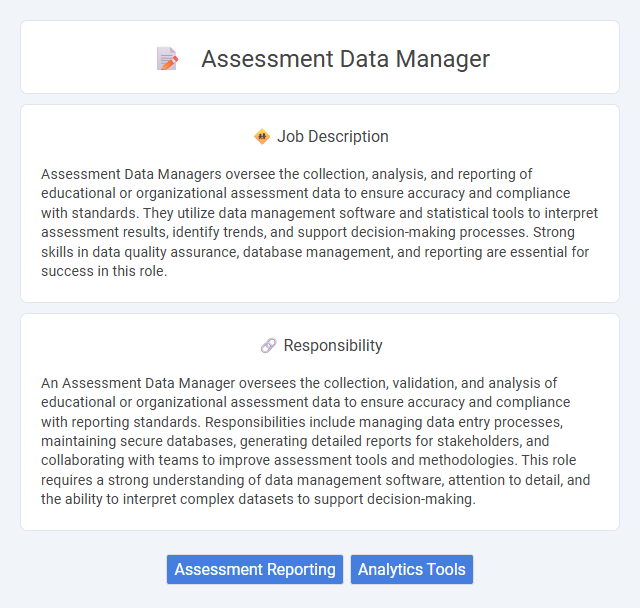
Assessment Data Managers oversee the collection, analysis, and reporting of educational or organizational assessment data to ensure accuracy and compliance with standards. They utilize data management software and statistical tools to interpret assessment results, identify trends, and support decision-making processes. Strong skills in data quality assurance, database management, and reporting are essential for success in this role.
Individuals with strong analytical skills and attention to detail are likely to be well-suited for the role of Assessment Data Manager, as the position demands accurate data collection and interpretation. Candidates who thrive in structured, data-driven environments and possess good communication abilities may find themselves successfully navigating the responsibilities of managing assessment data. Conversely, those who struggle with maintaining focus or handling complex datasets might encounter challenges in meeting the job's requirements.
Qualification
An Assessment Data Manager requires strong expertise in data analysis, educational assessment protocols, and database management systems such as SQL and Excel. Proficiency in statistical software like SPSS or R and experience with standardized testing platforms are essential for accurately interpreting and managing assessment data. Excellent organizational skills and attention to detail ensure compliance with data privacy standards and facilitate efficient reporting and evaluation processes.
Responsibility
An Assessment Data Manager oversees the collection, validation, and analysis of educational or organizational assessment data to ensure accuracy and compliance with reporting standards. Responsibilities include managing data entry processes, maintaining secure databases, generating detailed reports for stakeholders, and collaborating with teams to improve assessment tools and methodologies. This role requires a strong understanding of data management software, attention to detail, and the ability to interpret complex datasets to support decision-making.
Benefit
An Assessment Data Manager likely enhances the accuracy and reliability of educational or organizational evaluation processes by efficiently handling large datasets. Their role probably supports informed decision-making, leading to improved outcomes and resource allocation. Organizations may experience reduced errors and increased data integrity, contributing to strategic growth and performance optimization.
Challenge
Assessment Data Manager roles likely present challenges related to handling large volumes of complex data while ensuring accuracy and compliance with educational standards. Navigating the integration of diverse assessment platforms and managing real-time data updates may complicate data consistency. The probability of encountering evolving regulatory requirements further adds to the necessity for adaptable data management strategies.
Career Advancement
Assessment Data Manager roles offer significant career advancement opportunities by developing expertise in data analysis, educational assessments, and database management. Mastery in statistical software, data visualization tools, and educational measurement principles enhances eligibility for senior data strategist or assessment director positions. Continuous skill development in data integrity, reporting accuracy, and regulatory compliance positions candidates for leadership roles within educational institutions or assessment organizations.
Key Terms
Assessment Reporting
Assessment Data Managers oversee the accurate collection, analysis, and reporting of educational assessment data to support data-driven decision-making in schools and districts. They develop comprehensive reports detailing student performance metrics, trends, and achievement gaps, ensuring stakeholders receive timely and actionable insights. Expertise in data visualization tools, statistical software, and compliance with educational data standards is essential for delivering precise and meaningful assessment reporting.
Analytics Tools
Assessment Data Managers leverage advanced analytics tools such as SQL, Python, and Tableau to collect, process, and visualize large datasets for educational performance evaluation. Proficiency in data warehousing platforms and statistical analysis software enhances the accuracy of student assessment reporting and insights generation. Expertise in data integration and predictive modeling enables the optimization of testing strategies and identification of learning trends.
 kuljobs.com
kuljobs.com